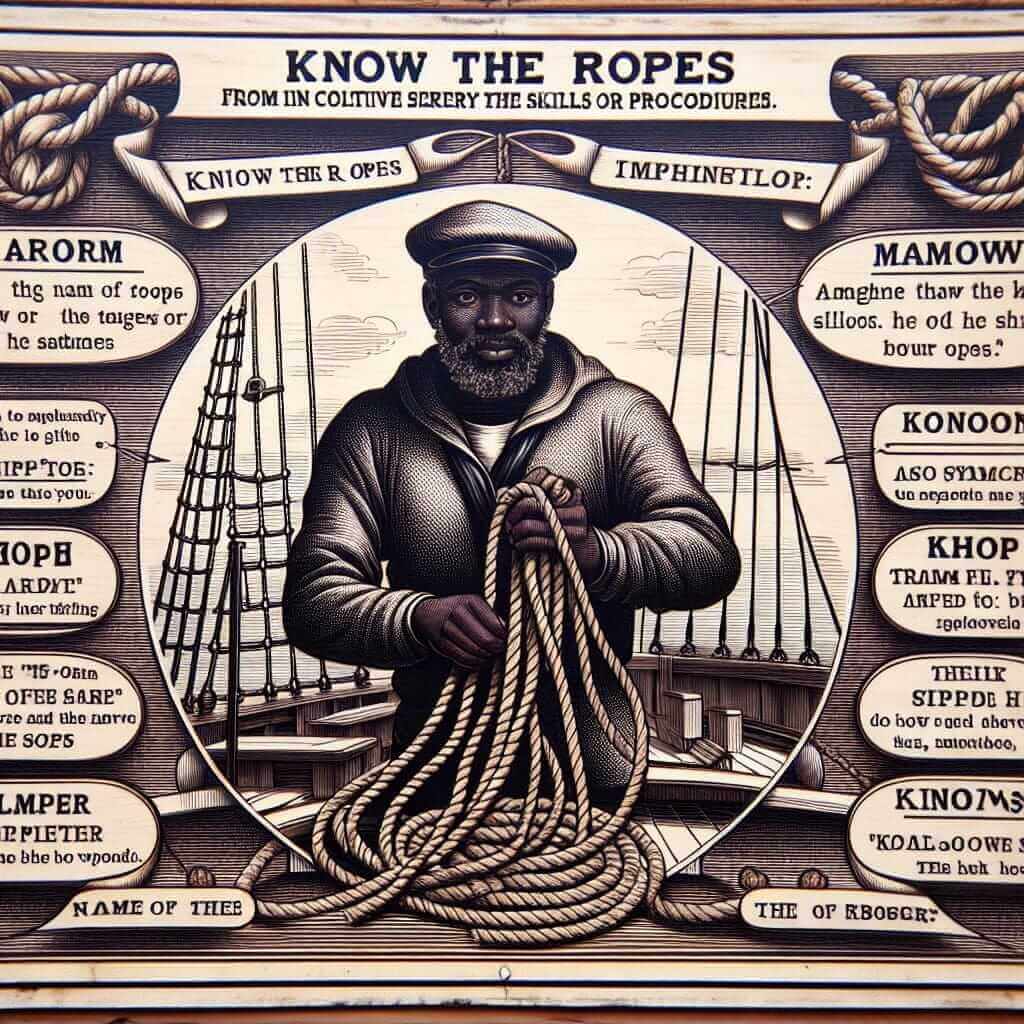Understanding idiomatic expressions is essential for excelling in the IELTS exam, as these phrases often appear in reading passages, listening exercises, and even writing and speaking prompts. One such idiom is “know the ropes”, which isn’t merely vocabulary but represents a deeper comprehension of English language nuances. In this article, we’ll explore the meaning, usage, and different forms of this idiom, along with real-life examples, especially in the context of IELTS.
What Does “Know the Ropes” Mean?
“Know the ropes” is an idiomatic expression that means being familiar with the details and nuances of a particular job or activity. The term originates from the nautical world, where sailors needed to know the ropes of a ship to handle it efficiently.
- Pronunciation: /nəʊ ðə rəʊps/
- Type of Word: Phrase (Idiom)
- Meaning: To be familiar with the details or procedures of a particular job.
- Example Sentence: “After a few weeks on the job, you’ll know the ropes.”
Synonyms and Related Terms
- Experienced (/ɪkˈspɪəriənst/) – Having knowledge or skill in a particular field.
- Example: “She’s an experienced teacher who knows the ropes of classroom management.”
- Knowledgeable (/ˈnɒlɪdʒəbəl/) – Well-informed about a particular subject.
- Example: “He is knowledgeable in IT and knows the ropes of software development.”
- Proficient (/prəˈfɪʃənt/) – Competent or skilled in doing or using something.
- Example: “She is proficient in English and knows the ropes of writing excellent essays.”
- Skilled (/skɪld/) – Having the ability to do something well.
- Example: “A skilled engineer knows the ropes of constructing safe buildings.”
- Adept (/əˈdɛpt/) – Very skilled or proficient at something.
- Example: “An adept chef knows the ropes of creating delicious dishes.”
Analyzing the Usage of “Know the Ropes” in IELTS
Frequency in IELTS
The phrase “know the ropes” can appear in various parts of the IELTS exam, particularly in the speaking and writing sections, where demonstrating a good command of idiomatic language can significantly benefit your score. Below, we analyze its relevance and provide illustrative examples.
Examples of “Know the Ropes” in IELTS
Speaking Section
In the speaking section, demonstrating your use of idiomatic expressions can show your fluency and flexibility with the English language.
-
Part 1: Interview
- Question: “Can you tell me about your job?”
- Answer: “Sure, I’ve been working as a project manager for five years. Initially, it was challenging, but now I really know the ropes.”
-
Part 2: Long Turn
- Prompt: “Describe a job you have had.”
- Answer: “I worked as a marketing assistant. At first, there were many tasks to handle, from social media management to writing copy. After a few months, I knew the ropes, and everything became much more manageable.”
-
Part 3: Discussion
- Question: “Do you think experience is important in a job?”
- Answer: “Absolutely. Experience helps you understand the ins and outs of your role. Knowing the ropes ensures that you can handle any situation effectively.”
Writing Section
In the writing section, using idiomatic language appropriately can enhance the quality of your essay by making it more engaging and natural.
-
Task 1: Describing a Process
- Example Sentence: “Employees who know the ropes of the production process can identify issues quickly and improve efficiency.”
-
Task 2: Opinion Essay
- Example Sentence: “In my opinion, having experienced workers who know the ropes is crucial for the success of any business.”
Combining “Know the Ropes” with Other Words
Using idioms correctly also involves pairing them with appropriate vocabulary to ensure the sentence flows naturally. Here are a few examples:
- Know the ropes of:
- Example: “He knows the ropes of managing a team.”
- Get to know the ropes:
- Example: “It’s important for new employees to get to know the ropes quickly.”
- Teach someone the ropes:
- Example: “The senior staff is responsible for teaching the newcomers the ropes.”
Related Idioms and Expressions
Adding idiomatic expressions related to “know the ropes” can enrich your vocabulary further.
- Learn the ropes – To learn how to do a particular job or activity.
- Example: “The first few weeks are crucial to learn the ropes.”
- Show the ropes – To teach someone how to do a task.
- Example: “The manager took time to show me the ropes.”
- Get the hang of it – To learn how to do something well.
- Example: “It took a while, but now I get the hang of it.”
- Be in the know – To be informed about something.
- Example: “Only a few people are in the know of the project.”
- Have a good grasp of – To understand something well.
- Example: “After a year, I have a good grasp of the company’s procedures.”
 Diagram explaining the idiom "know the ropes"
Diagram explaining the idiom "know the ropes"
Conclusion
In the IELTS exam, demonstrating an understanding of idiomatic expressions like “know the ropes” can significantly enhance your performance, particularly in the speaking and writing sections. Knowing how to use these expressions correctly not only shows your language proficiency but also makes your communication more natural and engaging.
To further practice, look for past IELTS exam questions that may require the use of idiomatic expressions, and try to incorporate “know the ropes” into your responses. This preparation will help you become more comfortable and confident in using English idioms effectively.
If you want more information on the usage of idioms in the IELTS exam or want to explore more idiomatic expressions, check out our other articles on IELTS Idioms. Keep practicing, and soon you’ll truly know the ropes when it comes to mastering the English language!


